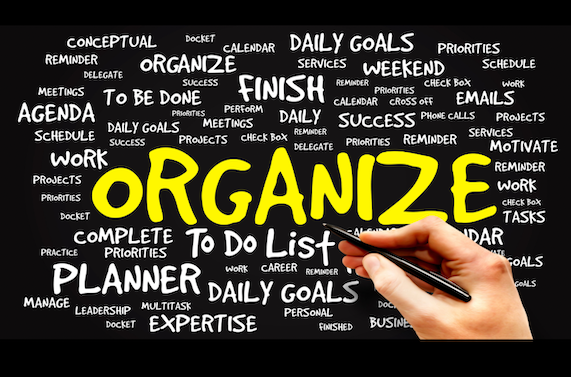
Written by Jennifer Cox LCPC
Let’s talk about Organization, another Executive Function.
People with ADHD have trouble organizing things. They have trouble organizing their thoughts, time, tasks, etc.
Research suggests that people with ADHD have abnormal activity and connectivity in areas of the brain responsible for executive functions such as organization. A lot of executive functions are involved with successful organization such as planning, task initiation, response inhibition, and working memory.
Some common difficulties experienced by individuals with ADHD during the organizational process include time management, keeping track of important information, and maintaining structure all while not getting distracted or falling into productive procrastination.
There are strategies and tips that can help improve organization skills:
-Establish a daily routine and sticking to a schedule. Creating consistent structure can help individuals with ADHD stay organized and manage their time more effectively, increase productivity, and reduce stress.
-Breaking tasks down into smaller, manageable steps can make them more approachable and less overwhelming. A lot of people who have ADHD struggle with task initiation (starting tasks), but by breaking it down it is easier to get started.
-Using visual aids, such as calendars, to-do lists, and reminders (people with ADHD tend to be very visual, so these are very helpful). These tools can help with prioritizing tasks and staying on track.
-Get a planner – Maybe categorize by color for personal, family, or work tasks.
-Time Blocking can be helpful by setting specific goals with deadlines. Breaking the day into clear time blocks with specific tasks can help your day feel a lot more organized.
-Decluttering your space can reduce distractions and improve focus. Developing an organizational system with bins, shelves, and labeled folders can make it easier to find and retrieve items when needed. Start by removing any unnecessary items from your space and keep only the things you need and use. This can help reduce visual and mental distractions and make it easier for you to focus on what’s important.
-Find a permanent home for the things you lose.
-Do a start-of-day or end-of-day clean. This can be helpful for people with ADHD because it’s small and simple, it creates a regular routine.
-Set reminders by using alarms or notifications to help you remember important events or deadlines. This can be especially helpful for tasks that tend to slip your mind easily.
-Systematic Approach – This involves choosing a task that you want to focus on completely, such as cleaning out your closet or going through the mail that’s been sitting on your desk for a week. You would work on the selected task for a 25 minute increment without interruptions. Once the time is up, you can take a short 5 minute break. Repeat this pattern a few more times, then reward yourself with a longer break.
-Body Doubling – If your biggest organization challenge is finding the motivation to get started, consider enlisting a friend, significant other, or family member to hold you accountable and they could remind you of your goal if they notice you’re starting to get off task. Check out body doubling on YouTube when you don’t have someone available.
Understanding each of the executive functions and how they can impact your day to day, can help one understand why ADHD is a serious disorder – This is a disorder that involves self-control, self-care, self-regulation, and self-motivation to get through your day.
Remember, it’s important to find the strategies that work best for you. Not every tip will resonate and that’s okay. Experiment with what works for you and adapt as necessary.
For more information or help with executive functioning, contact 815-363-0864 or info@echcounseling.com

